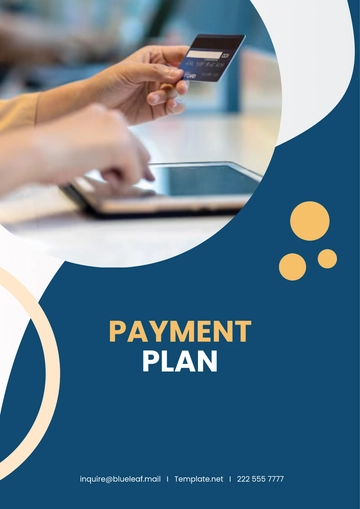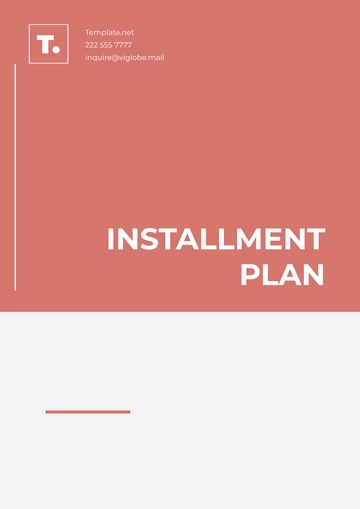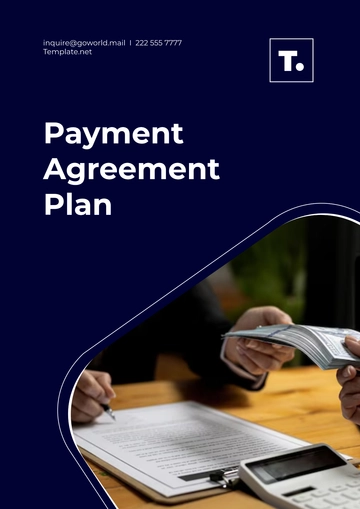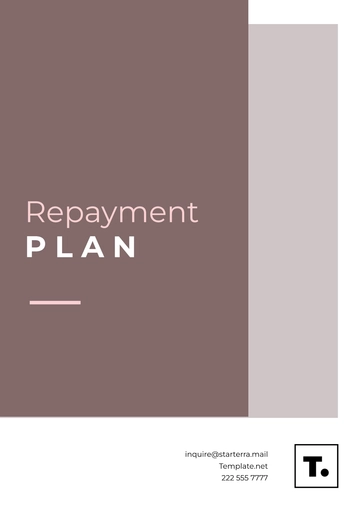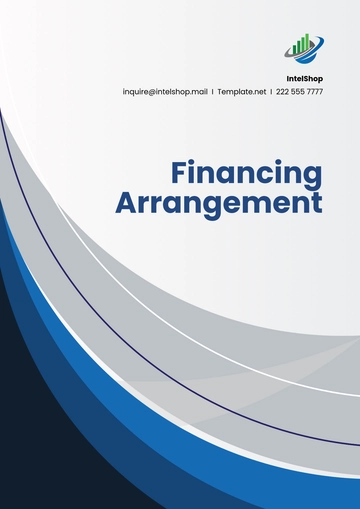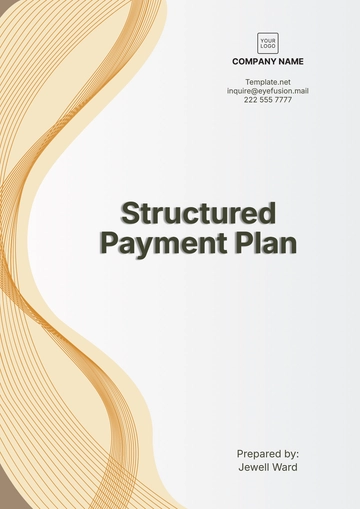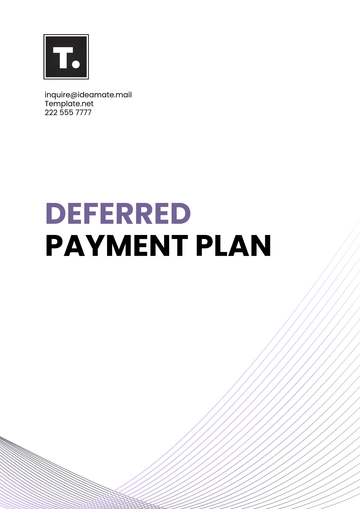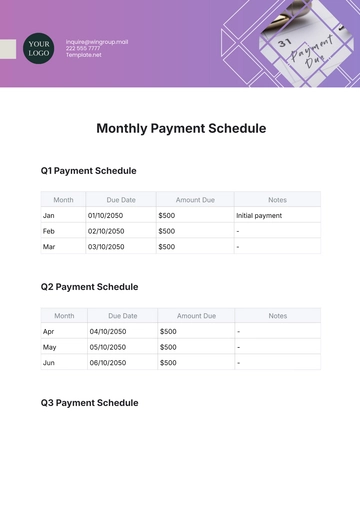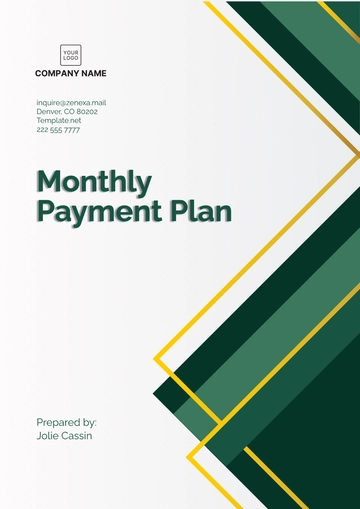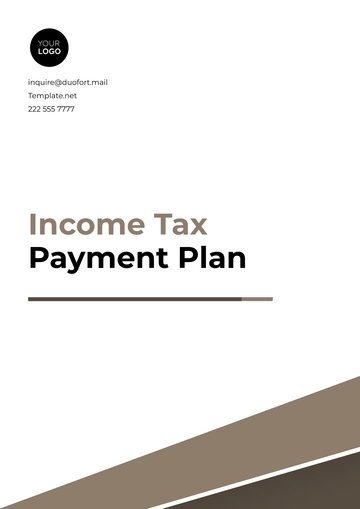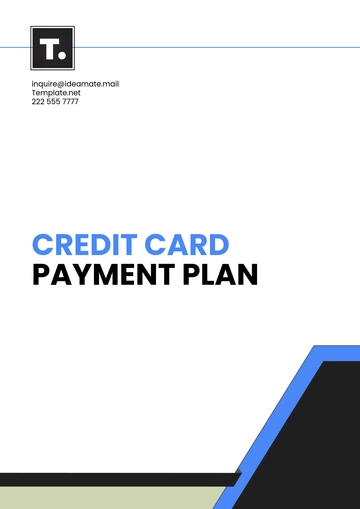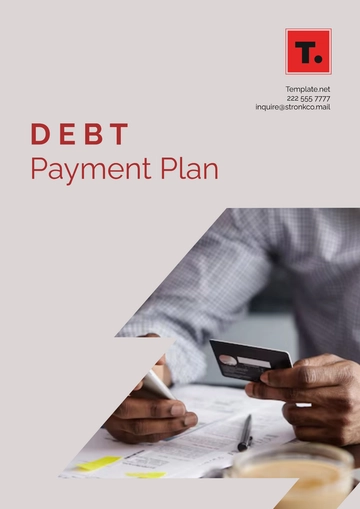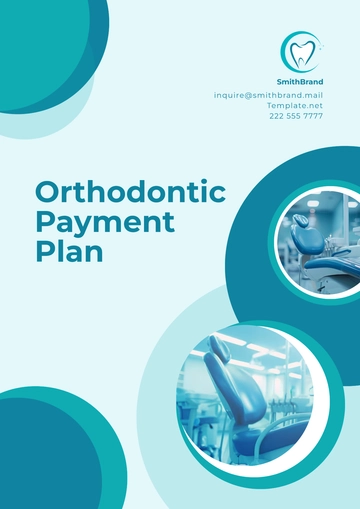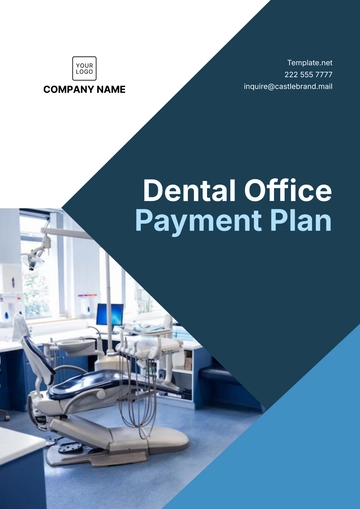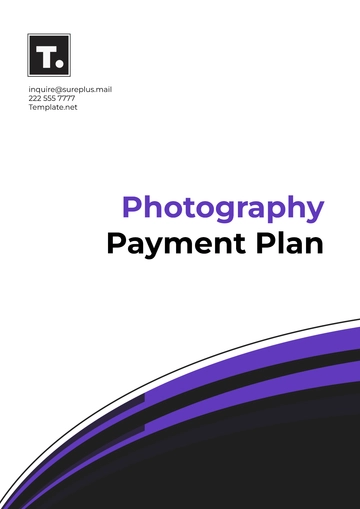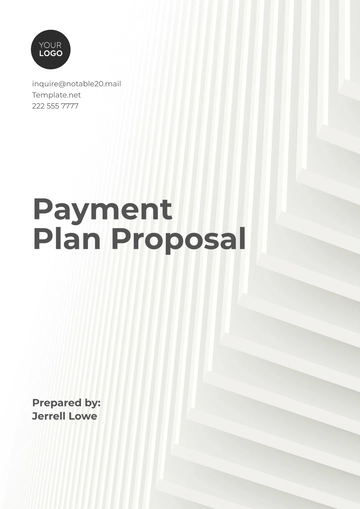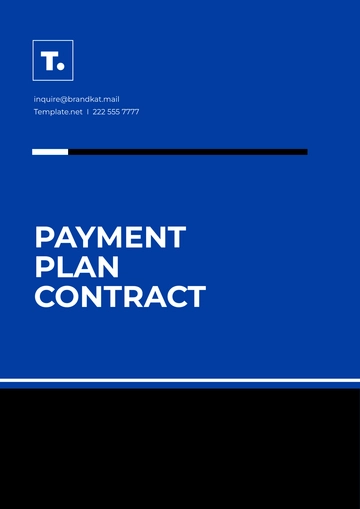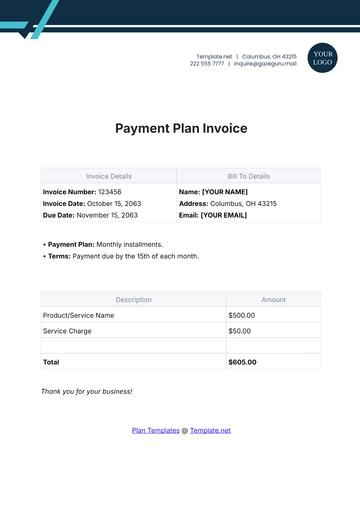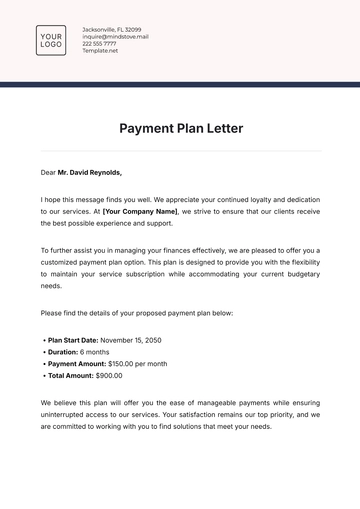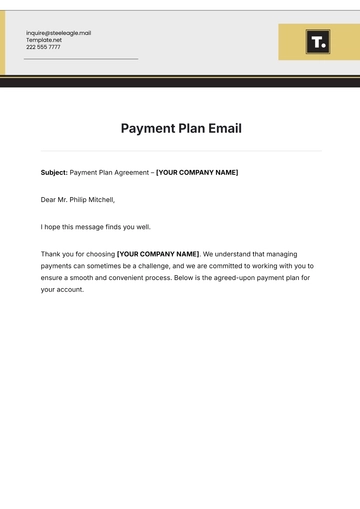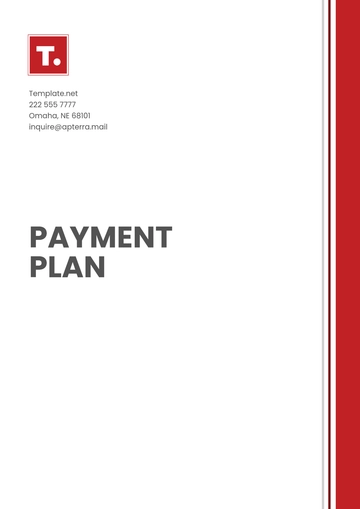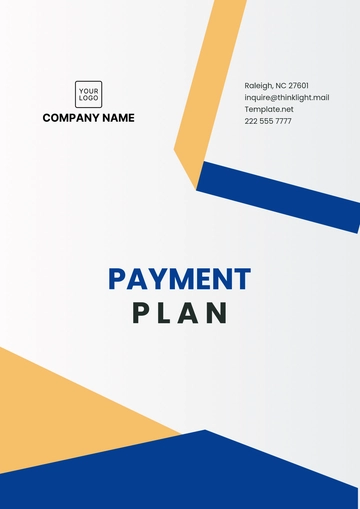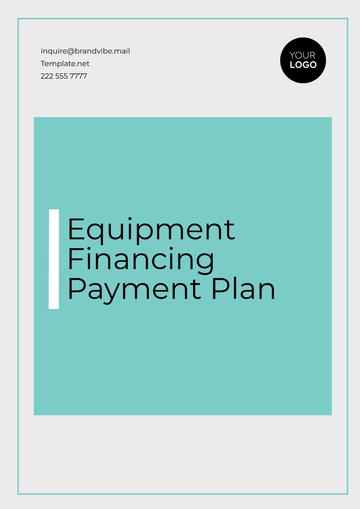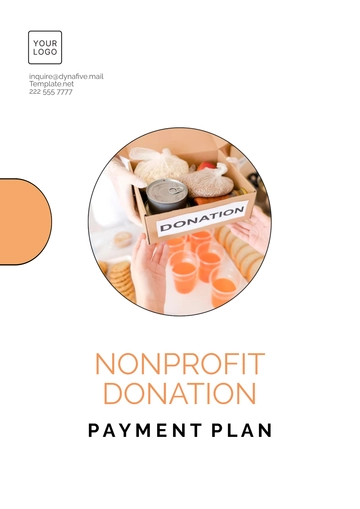Free Real Estate Payment Plan

[YOUR COMPANY NAME] | [YOUR COMPANY ADDRESS]
This plan outlines a comprehensive payment strategy for purchasing real estate, focusing on organizing financial resources, structuring payment schedules, and understanding associated legalities and taxes. The goal is to provide potential buyers with a clear roadmap to facilitate a smooth property acquisition process.
I. Introduction
Purchasing real estate is a significant financial decision that requires careful planning. A structured payment plan helps buyers manage their finances effectively, ensuring a successful transaction.
II. Preparing Financial Resources
A. Assessing Financial Health
Calculate current income and expenses
Analyze current debts and liabilities
Review existing savings and investments
B. Securing Financing
Explore mortgage options
Compare interest rates from multiple lenders
Understand pre-approval processes
III. Structuring the Payment Schedule
A. Down Payment
Determine the percentage of the property price to be paid upfront. Typically ranges from 5% to 20%.
B. Monthly Payments
Break down the total mortgage into manageable monthly payments. Consider the impact of interest rates and loan terms on monthly obligations.
C. Extra Payments
Arrange bi-weekly payments to reduce overall interest
Make lump-sum payments when possible
IV. Legal Considerations
A. Understanding Contracts
Review purchase agreements, ensuring all terms are thoroughly understood before signing. Consider consulting a legal expert.
B. Title Insurance
Secure title insurance to protect against unforeseen claims on the property.
V. Tax Implications
A. Property Taxes
Calculate the annual property tax obligations and factor them into the payment plan.
B. Tax Deductions
Explore potential tax deductions related to mortgage interest and property taxes to reduce overall tax liabilities.
VI. Finalizing the Purchase
A. Closing Procedures
Ensure all financial, legal, and logistical steps are completed. Attend the closing meeting to finalize the transfer of ownership.
B. Post-Purchase Considerations
Set up a maintenance budget
Plan for long-term financial sustainability
VII. Conclusion
A real estate payment plan is essential for managing the complexities of purchasing property. By organizing finances, understanding legal considerations, and anticipating tax implications, buyers can ensure smooth and successful real estate transactions.
- 100% Customizable, free editor
- Access 1 Million+ Templates, photo’s & graphics
- Download or share as a template
- Click and replace photos, graphics, text, backgrounds
- Resize, crop, AI write & more
- Access advanced editor
Create professional real estate payment plans with Template.net’s customizable Real Estate Payment Plan Template. Editable in our AI Editor Tool, this template is ideal for real estate agents, buyers, and sellers to outline payment schedules clearly. It ensures smooth transactions by detailing every payment term. Get it today, for free!
You may also like
- Finance Plan
- Construction Plan
- Sales Plan
- Development Plan
- Career Plan
- Budget Plan
- HR Plan
- Education Plan
- Transition Plan
- Work Plan
- Training Plan
- Communication Plan
- Operation Plan
- Health And Safety Plan
- Strategy Plan
- Professional Development Plan
- Advertising Plan
- Risk Management Plan
- Restaurant Plan
- School Plan
- Nursing Home Patient Care Plan
- Nursing Care Plan
- Plan Event
- Startup Plan
- Social Media Plan
- Staffing Plan
- Annual Plan
- Content Plan
- Payment Plan
- Implementation Plan
- Hotel Plan
- Workout Plan
- Accounting Plan
- Campaign Plan
- Essay Plan
- 30 60 90 Day Plan
- Research Plan
- Recruitment Plan
- 90 Day Plan
- Quarterly Plan
- Emergency Plan
- 5 Year Plan
- Gym Plan
- Personal Plan
- IT and Software Plan
- Treatment Plan
- Real Estate Plan
- Law Firm Plan
- Healthcare Plan
- Improvement Plan
- Media Plan
- 5 Year Business Plan
- Learning Plan
- Marketing Campaign Plan
- Travel Agency Plan
- Cleaning Services Plan
- Interior Design Plan
- Performance Plan
- PR Plan
- Birth Plan
- Life Plan
- SEO Plan
- Disaster Recovery Plan
- Continuity Plan
- Launch Plan
- Legal Plan
- Behavior Plan
- Performance Improvement Plan
- Salon Plan
- Security Plan
- Security Management Plan
- Employee Development Plan
- Quality Plan
- Service Improvement Plan
- Growth Plan
- Incident Response Plan
- Basketball Plan
- Emergency Action Plan
- Product Launch Plan
- Spa Plan
- Employee Training Plan
- Data Analysis Plan
- Employee Action Plan
- Territory Plan
- Audit Plan
- Classroom Plan
- Activity Plan
- Parenting Plan
- Care Plan
- Project Execution Plan
- Exercise Plan
- Internship Plan
- Software Development Plan
- Continuous Improvement Plan
- Leave Plan
- 90 Day Sales Plan
- Advertising Agency Plan
- Employee Transition Plan
- Smart Action Plan
- Workplace Safety Plan
- Behavior Change Plan
- Contingency Plan
- Continuity of Operations Plan
- Health Plan
- Quality Control Plan
- Self Plan
- Sports Development Plan
- Change Management Plan
- Ecommerce Plan
- Personal Financial Plan
- Process Improvement Plan
- 30-60-90 Day Sales Plan
- Crisis Management Plan
- Engagement Plan
- Execution Plan
- Pandemic Plan
- Quality Assurance Plan
- Service Continuity Plan
- Agile Project Plan
- Fundraising Plan
- Job Transition Plan
- Asset Maintenance Plan
- Maintenance Plan
- Software Test Plan
- Staff Training and Development Plan
- 3 Year Plan
- Brand Activation Plan
- Release Plan
- Resource Plan
- Risk Mitigation Plan
- Teacher Plan
- 30 60 90 Day Plan for New Manager
- Food Safety Plan
- Food Truck Plan
- Hiring Plan
- Quality Management Plan
- Wellness Plan
- Behavior Intervention Plan
- Bonus Plan
- Investment Plan
- Maternity Leave Plan
- Pandemic Response Plan
- Succession Planning
- Coaching Plan
- Configuration Management Plan
- Remote Work Plan
- Self Care Plan
- Teaching Plan
- 100-Day Plan
- HACCP Plan
- Student Plan
- Sustainability Plan
- 30 60 90 Day Plan for Interview
- Access Plan
- Site Specific Safety Plan
